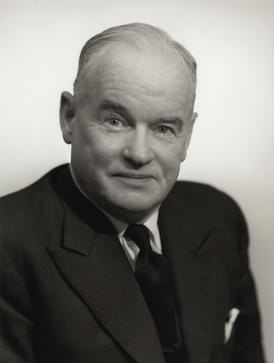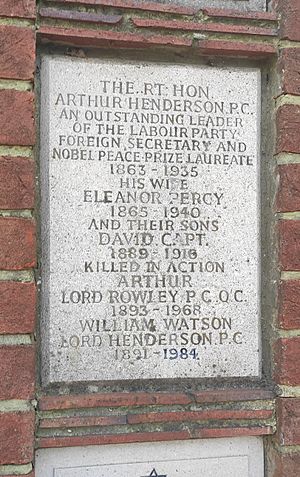Arthur Henderson, Baron Rowley facts for kids
Quick facts for kids
The Lord Rowley
|
|
|---|---|
 |
|
| Secretary of State for Air | |
| In office 7 October 1947 – 26 October 1951 |
|
| Prime Minister | Clement Attlee |
| Preceded by | Philip Noel-Baker |
| Succeeded by | William Sidney |
| Minister of State for Commonwealth Relations | |
| In office 14 August 1947 – 7 October 1947 |
|
| Prime Minister | Clement Attlee |
| Preceded by | Office Created |
| Succeeded by | Office Abolished |
| Under-Secretary of State for India and Burma | |
| In office 4 August 1945 – 14 August 1947 |
|
| Prime Minister | Clement Attlee |
| Preceded by | Roger Lumley |
| Succeeded by | Office Abolished |
| Financial Secretary to the War Office | |
| In office 7 February 1943 – 23 May 1945 |
|
| Prime Minister | Winston Churchill |
| Preceded by | Duncan Sandys |
| Succeeded by | Maurice Petherick |
| Under-Secretary of State for War | |
| In office 4 March 1942 – 7 February 1943 |
|
| Prime Minister | Winston Churchill |
| Preceded by | Edward Grigg |
| Succeeded by | Henry Page Croft |
| Member of Parliament for Rowley Regis and Tipton Kingswinford (1935–1950) |
|
| In office 14 November 1935 – 10 March 1966 |
|
| Preceded by | Alan Todd |
| Succeeded by | Peter Archer |
| Member of Parliament for Cardiff South |
|
| In office 30 May 1929 – 7 October 1931 |
|
| Preceded by | Arthur Evans |
| Succeeded by | Arthur Evans |
| In office 6 December 1923 – 9 October 1924 |
|
| Preceded by | Sir James Cory |
| Succeeded by | Arthur Evans |
| Personal details | |
| Born | 27 August 1893 |
| Died | August 28, 1968 (aged 75) |
| Nationality | British |
| Political party | Labour |
| Alma mater | Trinity Hall, Cambridge |
Arthur Henderson, Baron Rowley (born August 27, 1893 – died August 28, 1968) was an important British Labour Party politician. He held several key roles in the government and was a Member of Parliament for many years.
Contents
Arthur Henderson: A Life in Politics
Arthur Henderson was a dedicated public servant. He worked hard to represent the people in Parliament. He also served in different government jobs. His career spanned several decades.
Early Life and Learning
Arthur Henderson was the son of another famous politician, Arthur Henderson. His father was even the leader of the Labour Party several times. Young Arthur went to school at Central School in Darlington. He also studied at Queen's College, Taunton. Later, he attended Trinity Hall, Cambridge University. There, he earned degrees in Economics and Law.
While at Cambridge, he led the university's Labour Club. This showed his early interest in politics. In 1921, he became a barrister, which means he could practice law. That same year, he became the Secretary of the University Labour Federation. In 1939, he was made a King's Counsel. This is a special title for experienced lawyers.
Becoming a Member of Parliament
Arthur Henderson spent many years as a Member of Parliament (MP). An MP is someone elected to represent a local area in the House of Commons. This is where laws are made in the UK.
First Time in Parliament
Henderson was first elected as an MP in 1923. He represented the area of Cardiff South in South Wales. However, he lost his seat in the next election in 1924. He won it back in 1929.
In 1931, there was a big change in the Labour Party. Many Labour MPs, including Henderson, lost their seats. This happened when Prime Minister Ramsay MacDonald formed a "National Government."
Returning to Parliament
Henderson returned to Parliament in 1935. This time, he represented Kingswinford in England. He kept this seat until 1950. After that, he was elected for a new area called Rowley Regis and Tipton.
He continued to be an MP for Rowley Regis until he retired in 1966. After retiring, he was given a special title. He became a life peer called Baron Rowley. This meant he could sit in the House of Lords for the rest of his life. He passed away two years later, just after his 75th birthday.
Serving in Government
Arthur Henderson held important jobs in the government. He worked with two different Prime Ministers.
During World War II
During World War II, the UK had a special "coalition government." This meant different political parties worked together. Henderson served as the Under-Secretary of State for War from 1942 to 1943. This role meant he helped manage the British Army.
From 1943 to 1945, he was the Financial Secretary to the War Office. In this job, he was in charge of the money for the War Office. This was a very important role during the war.
After the War
After the war, in 1945, the Labour Party won a huge election. Arthur Henderson was then appointed as a junior minister for the India Office. This office dealt with India and Burma.
In 1947, India became independent. The India Office was then closed. Henderson was given a new, very important job. He became the Secretary of State for Air. This meant he was in charge of the Royal Air Force. He held this position until 1951, when the Labour Party lost the election.
Later Years and Legacy
In his later life, Arthur Henderson even appeared on an American TV game show called What's My Line? in 1957. He died in 1968, the day after his 75th birthday. He was cremated at Golders Green Crematorium.


